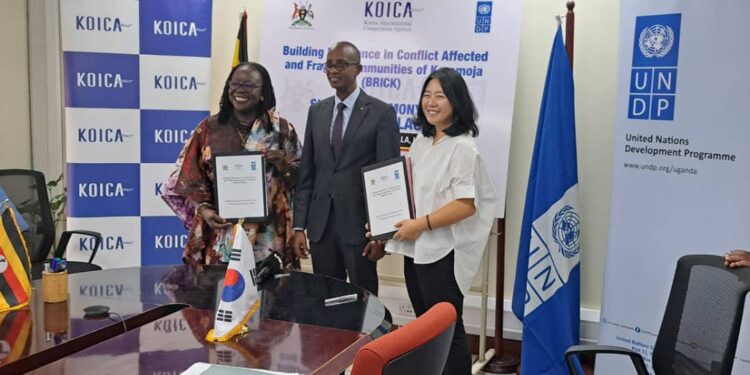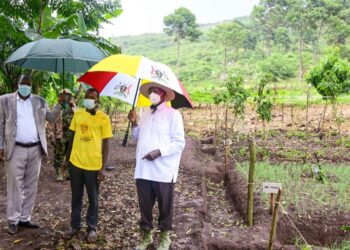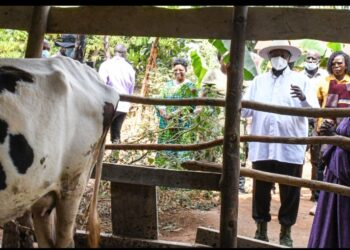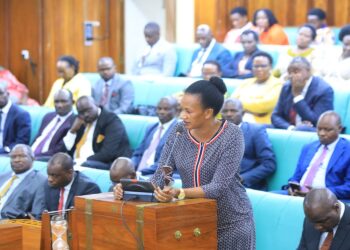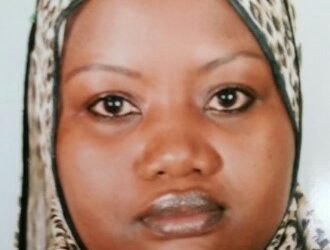The Commissioner of the Affirmative Action Program at the Office of the Prime Minister, Nobert Katsirabo has expressed deep appreciation for the partnership between UNDP, KOICA, and the Government of Uganda in addressing life-threatening challenges faced by the residents of Karamoja.
During the signing ceremony of the Building Resilience in Conflict Affected and Fragile Communities of Karamoja (BRICK) Project, Katsirabo stood in for Rose Alenga, the Permanent Secretary at the Office of the Prime Minister.
This significant event took place at the UNDP offices along the esteemed Prof Yusuf Lule Road in Kampala on November 3rd, 2023.
In a fervent address, Katsirabo highlighted the seamless integration of these development programs like BRICK into the National Development Plan III, underscoring their alignment with regional balanced development priorities.
He noted the persistently lagging indicators for Karamoja in comparison to other regions, casting this endeavor as of paramount importance to the government and the Affirmative Action Programs within the Office of the Prime Minister.
“If you see all the indicators for Karamoja region, they are the ones that are always behind in almost every indicator you check on. So for us as government, for us as affirmative action programs in the office of the Prime Minister, this is a very fundamental issue that we support,” noted Katsirabo.
He further detailed the ongoing collaborative efforts with the National Planning Authority in the Karamoja Regional Development Program, emphasizing the consultative processes that have involved NGOs, CSOs, development partners, and government entities.
Nevertheless, he stressed the significance of water for production and the critical need for security as foundational components in advancing Karamoja’s development.
Addressing the imperative of environmental sustainability in the face of climate change challenges, Katsirabo underscored the capriciousness of the seasons in Karamoja and its impact on agricultural endeavors.
He emphasized the need for self-sufficiency and the importance of empowering communities to sustain themselves, underlining the rigorous monitoring and diligent documentation of progress achieved in the implementation of the BRICK project.
In a heartfelt address, Elsie Attafua, the UNDP Resident Representative for Uganda, underscored the significance of the project, falling under the expansive framework of KOICA’s initiative centered around conflict prevention and fragility.
She lauded the strategic timing of the project, saying it coincides with the government’s ambitious 10-year development plan spearheaded by the National Planning Authority. This plan, she said outlined a vision for the future of Karamoja, aligning seamlessly with the goals of the initiative.
Moreover, she noted the government’s intensified efforts to shift focus from perpetual humanitarian aid to sustained development actions, particularly in the complex arena of Karamoja.
“We are also not only looking at the challenges that we want to address, but opportunities that we can leverage which you talked about and some of the challenges around unemployment, multi dimensional poverty, and you know, agriculture production,” said Ataffua.
She highlighted Karamoja’s abundant natural resources, particularly its generous rainfall, which surpasses that of many regions in Africa, including her homeland of Ghana. Attafua emphasized the potential for agricultural and value chain development, underlining the positive outlook for Karamoja’s future.
Jihee Ahn, KOICA Country Director-Uganda in her speech underscored the unique demographic of Karamoja, predominantly characterized by communities engaged in agro-pastoralism.
She emphasized the diverse array of ethnic groups in the region, each maintaining a multifaceted socio-economic system centered around the management of livestock and agriculture.
Ahn delved into the historical backdrop of Karamoja, explaining the enduring cycle of fragility and conflict that has plagued the region since Uganda’s independence. She acknowledged the inter and intra-district tensions exacerbated by limited resources and insecurity, which have significantly hindered socio-economic development efforts in the area.
Drawing a direct correlation between peace and sustainable development, Ahn wholeheartedly endorsed the notion that one cannot thrive without the other. She lauded KOICA’s conflict and fragility program as a pivotal step forward, positioning the government of Korea as a steadfast ally in overcoming the developmental hurdles faced by the region.
Ahn called upon UNDP to engage all pertinent stakeholders, particularly the Ministry of Karamoja Affairs, to ensure the resounding success of the BRICK project. She revealed Korea’s commitment to provide a significant portion of the project funding, contributing 4 million US dollars out of the total project cost of 5 million.
About the BRICK Project
Building Resilience in Conflict Affected and Fragile Communities of Karamoja (BRICK) Project is an intervention pioneered by Korea International Cooperation Agency (KOICA), United Nations Development Program (UNDP) and Government of Uganda in December 2022.
It sprung forth from a series of interactions intricately woven into the coordination processes under the Karamoja Integrated Development Plan III, blossoming forth in tandem with the implementation of related interventions over time.
The BRICK Project zeroed in on three pivotal districts—Moroto, Kaabong, and Kotido—out of the nine that collectively form the heart of Karamoja. This strategic focus, while commendable for its potency in generating impactful results with available resources, also beckons forth the imperative to glean and disseminate the invaluable lessons drawn from this endeavor.
The project’s objectives, delineated with precision, pulsated with purpose:
To foster harmonious coexistence through the establishment of functional peace infrastructure and the dividends of peace for cross-border communities in Karamoja.
To facilitate the augmentation of incomes for vulnerable households via environmentally sustainable livelihood options and the fortification of essential service institutions.
The scope of its beneficent reach encompassed a staggering 12,800 direct beneficiaries, with a resounding ripple effect on an additional 60,000 souls—women, youths, persons with disabilities, the elderly, and former warriors, all of whom stood to gain from this monumental effort.
Do you have a story in your community or an opinion to share with us: Email us at editorial@watchdoguganda.com


